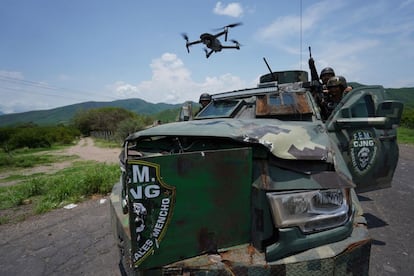Drones, explosives, impunity: A Mexican drug cartel flexes its muscle in Michoacán
Residents of the western state, one of the hardest hit by narc-related violence, feel abandoned and helpless against criminal groups such as Cartel Jalisco Nueva Generación


First there is an explosion, then fire and smoke. Dozens of people are seen running out of what look like huts hidden among the trees. Bombs fall on the village, and the camera zooms in to show the flames engulfing a yellowish forest. The video, which lasts two minutes and 20 seconds, was recorded on a drone controlled by the Jalisco New Generation Cartel (CJNG in its Spanish acronym), which led a bombing campaign last week on shantytowns in the Mexican municipality of Tepalcatepec, in Michoacán state.
The drone camera zooms in and out on the fire, and on residents fleeing in panic. At minute 1:18, the camera starts to twist chaotically, and then only blurred images can be seen: the inhabitants of the area have managed to shoot down the drone. This is how the footage was obtained, according to the newspaper El Universal.
That attack was not the only one of the day. The cartel launched an offensive on different communities in the same municipality, and in another video, two members of a local self-defense group can be seen armed and sheltering against a tree trunk. The gunfire of the drug traffickers pings around them. At one point, one of the men grabs his rifle and tries to shoot back, but the cartel’s firepower is much greater and they are forced to flee. The footage then becomes adrenaline-pumping: they escape through the forest as the omnipresent gunfire echoes in the background.
Last week, in another video posted on social media, Tepalcatepec’s mayor, Martha Laura Mendoza, is heard pleading for help from the authorities: “In Tepalcatepec we have had four months of insecurity. No one takes any notice of us. Everything that has been said here is very nice, and hopefully it will happen. But this is the only municipality in which we have more than 3,000 displaced people.” She pauses, and repeats urgently: “Four months and no one looks back at us, no one offers a solution!”

Michoacán state has been dominated by drug groups ever since these came into existence. But in recent months the situation has intensified in a battle between rival cartels. The CJNG is never far away. This is not the first time the criminal group has unleashed drone attacks on the region, and the air raids have become a common way of demonstrating firepower more associated with a professional army. In addition to wiping out any opposition, the drug lords challenge federal authorities to respond, which they often decline to do. It is not uncommon to see news in the local press about towns deserted by police, overcome by the armed deployment of drug traffickers.
Since the 1990s, dozens of self-defense groups have also joined this explosive mix, tired of what they consider to be institutional neglect. These ordinary citizens decided to arm themselves to protect their communities against organized crime, and their ranks now number between 15,000 and 25,000 people, according to estimates by Romain Le Cour, coordinator of the think tank Mexico Evalúa’s security program, which conducted an in-depth investigation into the matter. As a result, researchers found, acts of violence have multiplied.
Massacres occur with total impunity in Michoacán, a state with fewer than five million inhabitants but some of the grimmest crime statistics in Mexico. On average, seven people were summarily executed every day between January and October 2021 alone, with 2,234 homicides registered during that period, according to the local newspaper El Sol de Morelia. Things are getting steadily worse: since 1964, 4,242 people have disappeared, according to official data, but 952 of these cases occurred in the last year alone.
Michoacán’s inhabitants have been forced to get used to extreme violence in a security vacuum where the state doesn’t dare to tread. Bodies are found abandoned in ditches or hanging from bridges, and state buildings are razed to the ground with Molotov cocktails. Even a professional basketball player was recently kidnapped, although he was later found alive and tied to a tree. Behind it all is the Jalisco New Generation Cartel, with growing firepower and no fear of boasting about it, acting with total impunity.
Tu suscripción se está usando en otro dispositivo
¿Quieres añadir otro usuario a tu suscripción?
Si continúas leyendo en este dispositivo, no se podrá leer en el otro.
FlechaTu suscripción se está usando en otro dispositivo y solo puedes acceder a EL PAÍS desde un dispositivo a la vez.
Si quieres compartir tu cuenta, cambia tu suscripción a la modalidad Premium, así podrás añadir otro usuario. Cada uno accederá con su propia cuenta de email, lo que os permitirá personalizar vuestra experiencia en EL PAÍS.
¿Tienes una suscripción de empresa? Accede aquí para contratar más cuentas.
En el caso de no saber quién está usando tu cuenta, te recomendamos cambiar tu contraseña aquí.
Si decides continuar compartiendo tu cuenta, este mensaje se mostrará en tu dispositivo y en el de la otra persona que está usando tu cuenta de forma indefinida, afectando a tu experiencia de lectura. Puedes consultar aquí los términos y condiciones de la suscripción digital.








































